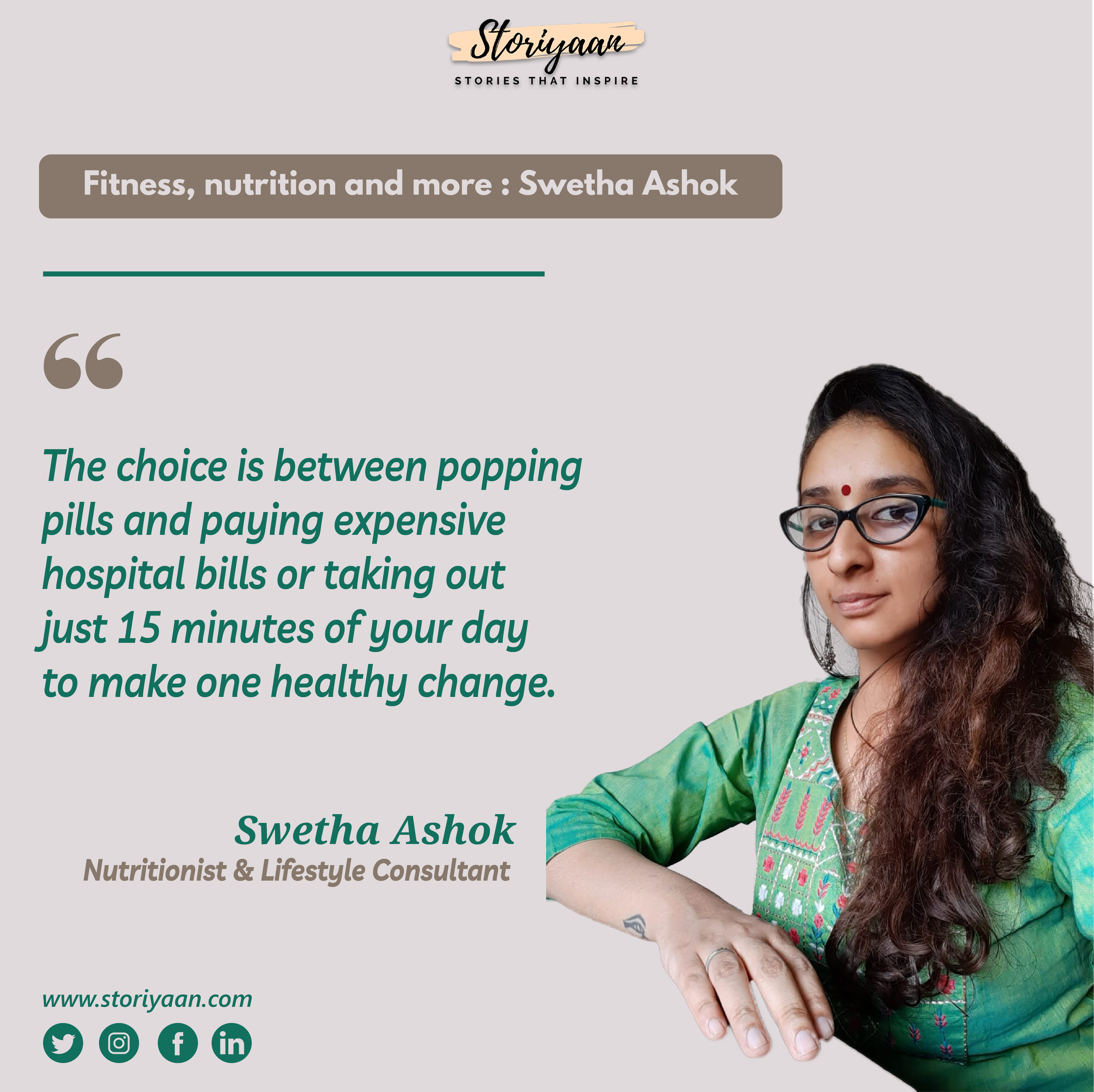“A holistic approach is not a diet or a one-time solution – it is a way of life. Moreover, a healthy lifestyle is not as tough as it is made out to be. If you do what’s right for your body and mind you will automatically see differences and eventually, have fun!”, explains Swetha. Swetha Ashok is a Nutritionist and Lifestyle Consultant who is de-cluttering the world of Healthy Living for all of us. Having a background in biochemistry, microbiology and nutrition; she is armed with a thorough understanding of physiology, gut health and bacteria.
Unlike several others, Swetha rejects the notion of prescribing strict diet charts. She believes that education and explanation of the “Whats” and “Hows” of a meal coupled with increasing awareness ensure informed decisions. Discover the nitty-gritty of a fun and healthy life, quick health advice and much more in this “healthy” conversation with Swetha.

Interview
Questions and answers
You come from a background in biochemistry, microbiology, and nutrition. What sparked your curiosity about the intricacies of food in the first place?
I have always been inclined towards how our body and mind work and how what we eat fuels it. Moreover, I have always been passionate about different cultures and varying food choices. This assisted me to ease into this field.
The field of nutrition is robustly competitive with newer career paths opening up. What has been your motivation and secret to remain at the top of your game?
Honestly, it has always been about staying true to my path and the mission of my brand which is a sustainable, stress-free and convenient approach towards health. Thus, we are never fazed by the competition as we believe in giving our best to our customers.
How can one maintain a healthy diet in these stressful times of COVID?
To begin with, we should check our diets. Considering, we are mostly at home, we can bring smaller but incremental changes like drinking more water, reducing dairy consumption post 7 pm and stretching every 1 hour. Additionally, try to include seasonal fruits and vegetables in your diet.
What are some measures that can be adapted to live a healthy lifestyle?
Firstly, always aim for progress over perfection. Make a conscious and small change every day like replacing pizza with home-cooked meals twice a week. Don’t try to achieve outstanding changes on the very first day as consistency is the key.
You mentioned that you don’t believe in just prescribing incomprehensible dietary practices, but in educating on the WHATs and HOWs about the meal. Could you perhaps elaborate a bit on that?
When you educate a person about the ingredients, why or in what way they affect them; they will understand and evaluate their lifestyle choices more effectively. This ensures that I am not only feeding them with information but inducing them to actively contribute to the process.
How has nutrition awareness changed since you started working in the field and what are some of the skills one must possess to remain relevant in the field?
The awareness of healthy living is slowly getting prominence. People are realizing the importance of diet, exercise, sleep, stress management but a lot of fad diets are being popularized at the same time. To remain relevant, one must go beyond the book. As the industry depends on communication, incorporating digital and social media marketing can be highly beneficial.
A lot of lifestyle coaches prefer to remain strict with their clients to push them towards their desired goals but you believe in maintaining strong interpersonal relationships with every individual under your care. How does this amiable atmosphere help you motivate them more effectively?
Strictness might be counter-productive for some clients. You don’t want them to hate the journey. I believe, it is only when the clients enjoy and find interest in their transformation journey that the goals are more fulfilling.
As a nutritionist, what are some of the challenges that you face daily?
The biggest challenge is to educate people about the harmful effects of fad diets and quick fixes. Furthermore, people expect us to never break our diet or exercise routines but it’s utopian as we too have cravings or lazy days like everyone else. This can get burdensome at times.
What would be some of the dietary practices that you would recommend for those suffering from diabetes and some exercises that would complement the diet?
A balanced diet taken in regular intervals as small meals can be beneficial. Diabetics should avoid starchy foods and include a minimum of 45 min work every day. In addition, a combination of aerobic and strength training is also important, especially for diabetics.
In today’s time when there is such a media hype about bread, peanut butter, health seeds, protein shakes, energy bars, how far is the Indian staple diet efficient in keeping up with the nutrition needs of individual age groups?
Supplements are not necessary for sustaining a fit and healthy lifestyle. Our local, seasonal, cultural food is enough and plenty for ensuring fitness and good health.
Quick 5
1.One food item you would recommend for a cancer survivor – Antioxidant-rich and anti-inflammatory foods like beans, whole grains, lentils etc.
2.One food you always stay away from – Nothing, balancing is the key.
3.You don’t start your day without – Meditation
4.Your favourite form of exercise – Yoga, Pilates & dance.
5.One ingredient that can stimulate metabolism – No specific ingredient.

